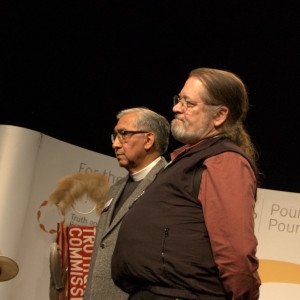
(L) Sidney Black, Archdeacon of Native Ministries, the Diocese of Calgary, Co-chair of ACIP, (R) Mark MacDonald, National Indigenous Anglican Bishop
Yesterday the Anglican Church of Canada added a detailed timeline of the evolving relationship between Indigenous people and the church to the bentwood box. This expression of reconciliation covers more than 500 years of history, showing the often difficult and misguided intertwining of Indigenous life and Christian faith. It begins with the 1452 decree by European leaders that non-Christian nations have no rights to their land and sovereignty in the face of claims by Christian sovereigns.
Esther Wesley, coordinator for the Anglican Fund for Healing and Reconciliation, introduced the gesture and the Anglican delegation that presented it. She reminded us that in these intertwining stories there were many for whom Anglican and Indigenous are not mutually exclusive categories. She spoke of the many, many Indigenous children who survived Indian Residential Schools and went on to love and serve the same church that was such a destructive force in their lives and communities. This includes National Indigenous Anglican Bishop Mark MacDonald, whose grandfather was a residential school survivor.
The timeline, like reconciliation itself, is incomplete and ongoing. As it becomes more detailed, it challenges dominant narratives about Anglican history in Canada. It makes space for reconsidering how we imagine ‘us’ and ‘them’, how we imagine the Gospel working in history, and where God might be leading us out of these stories.
It also reminds us that reconciliation is not a static goal to be achieved. Instead, it is a verb. It is something we do, something that will grow as we grow, something that will take shape according to the people and communities that participate in it. Every person, every parish, every leader will define reconciliation as they live it out. In this, we can find enormous hope for right relations and for the place of Indigenous people in the Anglican church.
As Christians, we are well rehearsed in being open to ongoing revelation. We are called in prayer and in community to constantly listen for what the Word is saying about our unique time and place in history. In this faithful listening will we find wisdom and courage to make history a timeline that moves ever closer to God’s will for us.
How are you working to understand reconciliation in your life and for your parish? How are you creating a timeline that embodies right relationship and justice?

By Barbara Liotscos March 29, 2014 - 2:05 pm
I appreciated Mark MacDonald’s reminder that the church was a guarantor of the treaties, and I hope that the church can honour and by God’s grace, fulfil that responsibility. Jesus said “by their fruits you shall know them” and that is similar to what is being said at the TRC – our actions, not our words, will carve reconciliation.
By Erin Green March 29, 2014 - 4:33 pm
Thanks so much for your thoughtful comment and for weighing in, Barbara. Peace.
By Tony Houghton March 29, 2014 - 3:28 pm
Reconciliation is a two way street.both sides have to be involved. One side can ask for forgiveness but the other does not or can not forgive then reconciliation ends there.Both have to be active participants for it to work but sometime ,looking from the outside in , it seems that we can’t seem to move on to a healthy reconciliation but as Gordon Lightfoot wrote in a song “And if time could heal the wounds ,I would tear the treads away that I may bleed some more ”
So here hoping that true reconciliation is established and something very fruitful will come of this tragedy.
By Erin Green March 29, 2014 - 4:34 pm
Hi, Tony . . . thanks for your reflection and for thinking about reconciliation and for taking time to weigh in. peace.